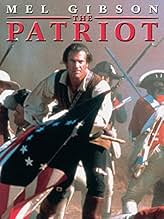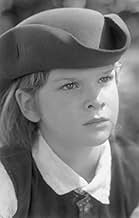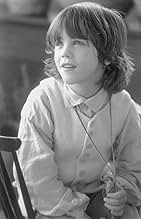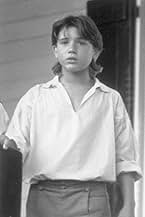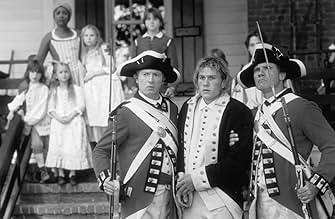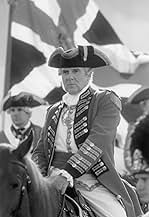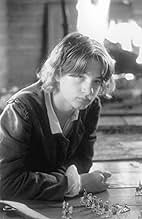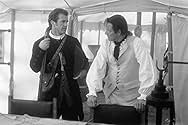Der friedliche Bauer Benjamin Martin wird während der amerikanischen Revolution dazu gebracht, die Kolonialmiliz anzuführen, als ein sadistischer britischer Offizier seinen Sohn ermordet.Der friedliche Bauer Benjamin Martin wird während der amerikanischen Revolution dazu gebracht, die Kolonialmiliz anzuführen, als ein sadistischer britischer Offizier seinen Sohn ermordet.Der friedliche Bauer Benjamin Martin wird während der amerikanischen Revolution dazu gebracht, die Kolonialmiliz anzuführen, als ein sadistischer britischer Offizier seinen Sohn ermordet.
- Für 3 Oscars nominiert
- 9 Gewinne & 23 Nominierungen insgesamt
Handlung
WUSSTEST DU SCHON:
- WissenswertesHeath Ledger didn't work for a year because he only got offers for teen heartthrob roles. He was about to quit acting, and return to Australia, when he was cast in the film.
- PatzerGeorge Washington's proclamation regarding the freeing of slaves who give one year of service is incorrectly interpreted. The historical offer applied to slaves who enlisted in the Continental regulars or served in regular state forces which served with Continental armies. It did not apply to units such as Benjamin Martin's local militia, which solely were under state control.
- Zitate
Colonel William Tavington: Kill me before the war is over, will you? It appears that you are not the better man.
Benjamin Martin: You're right. My sons were better men.
- Alternative VersionenIn the extended edition, Benjamin Martin's youngest children get their first taste of the horrors of war prior to Thomas's death. This comes just before the evening when Gabriel stumbles home after being wounded in a nearby battle. Something (the viewer is unaware) catches the attention of the Martin children and they stride over to a nearby creek/river to investigate. What they discover are the bodies of several soldiers floating downstream. Martin then comes over and ushers the children back into the house.
- SoundtracksBoney
Traditional
Performed by Marquetta L. Goodwine and the Gullah Cunneckshun
Ausgewählte Rezension
Whenever I see a film that is supposed to have historical basis, I am always a bit surprised to find out how much people complain about historical inaccuracies. I admit that I have done so in a few cases myself (Thin Red Line). However, in this case, I feel I must point out a few things.
All such films come with a disclaimer saying something to the effect that the characters portrayed aren't real and the story is just that, a story. For entertainment. Martin and Tavington did not actually exist, they are merely characters, possibly based (as has been suggested) on actual historical figures. I often wonder if such films as Treasure of the Sierra Madre, or Rio Grande, or just about any western flick was judged so harshly when it came out as we judge 'historical' pictures today? Or any pirate film? Zorro? Any film with knights in it? It seems to me that unless you are making a documentary, the historical accuracy doesn't truly matter in detail. Certainly, I enjoy films better when they seem to be a reasonably accurate portrayal of a time (costumes, technologies), but I don't carp about whether some person existed. Even if they did, I expect the film to be untrue so I can be entertained. For example, most wars are not constant fighting. Certainly some battles went on for days at a time, but there is a lot of waiting and a lot of marching. Yet most war films seem to be battle after battle after battle, with no real respite except for the wounded. Not so. How about some facts? Fact: Americans fought against themselves during the war. Many Americans served with the British forces. Fact: There were in fact many atrocities committed by the British forces, rapes, property burning, etc. Don't believe me? Check out the history of what happened to the original signers of the Declaration of Independence, their families and their properties. That's actual history, not just entertainment history. Of course, this wasn't only limited to the British forces. According to Massachusetts history, the Revolutionary forces (not necessarily the armed forces even) were, um, not kind to people who sympathized with the British. The tavern recruitment scene suggests this quite well. Were churches actually burned with a town's population inside. Maybe, maybe not, but it certainly was dramatic, wasn't it? Fact: Literacy was not as common at that time as it is today. Many people, especially the lower classes, and slaves could not read.
Did Cornwallis have a pair of great danes that were 'captured' by the enemy? I doubt it, but possibly. Were slaves that served in either army freed after a certain term of service? Again, I don't know. (I am not even certain that slavery was allowed in Britain at the time. Indentured servants, I think yes (though the difference is slight, I grant you), but actual slavery, hmm. I'll have to check on that.) The colonies typically did form their own militias for local use. The americans did, as a general rule, fight using more guerilla tactics (especially early on, the american forces were composed largely of more militia than regulars, see below for comments on militia), check the accounts of the battle of Concord, and what happened to the British forces as they withdrew.
War is brutal and ugly. People die. Many of the soldiers don't want to be there. Militia, being less well trained and thus disciplined, does have a tendency to fight very poorly in set piece battles (check current and past arguments for keeping a 'standing' 'professional' army).
Ignoring the historical accuracies or lack thereof (and btw, Braveheart was not 100% accurate either, though the main characters , Wallace, Robert the Bruce, King Edward, did all exist, but again, I don't seem to recall people complaining so loudly about that) I found Mel's character to be believable and well portrayed. Yes, there were elements of Hollywood happiness in the film (the beach town, he workers attitudes, the romances) and Hollywood sadness' in the film (the massacre, the child's death), but it was very entertaining. I found many of the battles to be very realistic (okay, pistols WERE NOT that accurate and never have been) and sufficiently entertaining for my needs.
Overall, a very good film. Hollywood, certainly, but entertaining.
All such films come with a disclaimer saying something to the effect that the characters portrayed aren't real and the story is just that, a story. For entertainment. Martin and Tavington did not actually exist, they are merely characters, possibly based (as has been suggested) on actual historical figures. I often wonder if such films as Treasure of the Sierra Madre, or Rio Grande, or just about any western flick was judged so harshly when it came out as we judge 'historical' pictures today? Or any pirate film? Zorro? Any film with knights in it? It seems to me that unless you are making a documentary, the historical accuracy doesn't truly matter in detail. Certainly, I enjoy films better when they seem to be a reasonably accurate portrayal of a time (costumes, technologies), but I don't carp about whether some person existed. Even if they did, I expect the film to be untrue so I can be entertained. For example, most wars are not constant fighting. Certainly some battles went on for days at a time, but there is a lot of waiting and a lot of marching. Yet most war films seem to be battle after battle after battle, with no real respite except for the wounded. Not so. How about some facts? Fact: Americans fought against themselves during the war. Many Americans served with the British forces. Fact: There were in fact many atrocities committed by the British forces, rapes, property burning, etc. Don't believe me? Check out the history of what happened to the original signers of the Declaration of Independence, their families and their properties. That's actual history, not just entertainment history. Of course, this wasn't only limited to the British forces. According to Massachusetts history, the Revolutionary forces (not necessarily the armed forces even) were, um, not kind to people who sympathized with the British. The tavern recruitment scene suggests this quite well. Were churches actually burned with a town's population inside. Maybe, maybe not, but it certainly was dramatic, wasn't it? Fact: Literacy was not as common at that time as it is today. Many people, especially the lower classes, and slaves could not read.
Did Cornwallis have a pair of great danes that were 'captured' by the enemy? I doubt it, but possibly. Were slaves that served in either army freed after a certain term of service? Again, I don't know. (I am not even certain that slavery was allowed in Britain at the time. Indentured servants, I think yes (though the difference is slight, I grant you), but actual slavery, hmm. I'll have to check on that.) The colonies typically did form their own militias for local use. The americans did, as a general rule, fight using more guerilla tactics (especially early on, the american forces were composed largely of more militia than regulars, see below for comments on militia), check the accounts of the battle of Concord, and what happened to the British forces as they withdrew.
War is brutal and ugly. People die. Many of the soldiers don't want to be there. Militia, being less well trained and thus disciplined, does have a tendency to fight very poorly in set piece battles (check current and past arguments for keeping a 'standing' 'professional' army).
Ignoring the historical accuracies or lack thereof (and btw, Braveheart was not 100% accurate either, though the main characters , Wallace, Robert the Bruce, King Edward, did all exist, but again, I don't seem to recall people complaining so loudly about that) I found Mel's character to be believable and well portrayed. Yes, there were elements of Hollywood happiness in the film (the beach town, he workers attitudes, the romances) and Hollywood sadness' in the film (the massacre, the child's death), but it was very entertaining. I found many of the battles to be very realistic (okay, pistols WERE NOT that accurate and never have been) and sufficiently entertaining for my needs.
Overall, a very good film. Hollywood, certainly, but entertaining.
Top-Auswahl
Melde dich zum Bewerten an und greife auf die Watchlist für personalisierte Empfehlungen zu.
Details
- Erscheinungsdatum
- Herkunftsländer
- Offizielle Standorte
- Sprachen
- Auch bekannt als
- El patriota
- Drehorte
- Rock Hill, South Carolina, USA(Revolutionary War Re-enactment battles)
- Produktionsfirmen
- Weitere beteiligte Unternehmen bei IMDbPro anzeigen
Box Office
- Budget
- 110.000.000 $ (geschätzt)
- Bruttoertrag in den USA und Kanada
- 113.330.342 $
- Eröffnungswochenende in den USA und in Kanada
- 22.413.710 $
- 2. Juli 2000
- Weltweiter Bruttoertrag
- 215.294.342 $
- Laufzeit2 Stunden 45 Minuten
- Farbe
- Sound-Mix
- Seitenverhältnis
- 2.39 : 1
Zu dieser Seite beitragen
Bearbeitung vorschlagen oder fehlenden Inhalt hinzufügen




